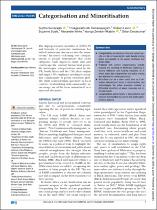| dc.contributor.author | Zembe-Mkabile, Wanga | |
| dc.contributor.author | Selvarajah, Sujitha | |
| dc.contributor.author | Deivanayagam, Thilagawathi Abi | |
| dc.contributor.author | Lasco, Gideon | |
| dc.date.accessioned | 2022-11-18T12:57:58Z | |
| dc.date.available | 2022-11-18T12:57:58Z | |
| dc.date.issued | 2020 | |
| dc.identifier.citation | Selvarajah S, Deivanayagam TA, Lasco G, et al. Categorisation and Minoritisation. BMJ Global Health 2020;5:e004508. doi:10.1136/ bmjgh-2020-004508 | en_US |
| dc.identifier.uri | https//doi.org:/10.1136/ bmjgh-2020-004508 | |
| dc.identifier.uri | http://hdl.handle.net/10566/8173 | |
| dc.description.abstract | The disproportionate mortality of COVID-19
and brutality of protective institutions has
shifted anti-racism
discourses into the mainstream.
1 Increased reckoning over categorisations
of people demonstrate that racial
categories, while imprecise, fluid, time and
context-specific,
embody hierarchical power.
We interrogate categorisations used in the
UK, South Africa and the USA; their origins
and impact. We emphasise needing to recognise
commonality of power structures globally,
while acknowledging specificity in local
contexts. In identifying such commonality, we
encourage use of the term ‘minoritised’ as a
universal alternative. | en_US |
| dc.language.iso | en | en_US |
| dc.publisher | BMJ Global health | en_US |
| dc.subject | Global commonality | en_US |
| dc.subject | Minoritised | en_US |
| dc.subject | Masking inequality | en_US |
| dc.subject | Data collection | en_US |
| dc.title | Categorisation and Minoritisation | en_US |
| dc.type | Article | en_US |

